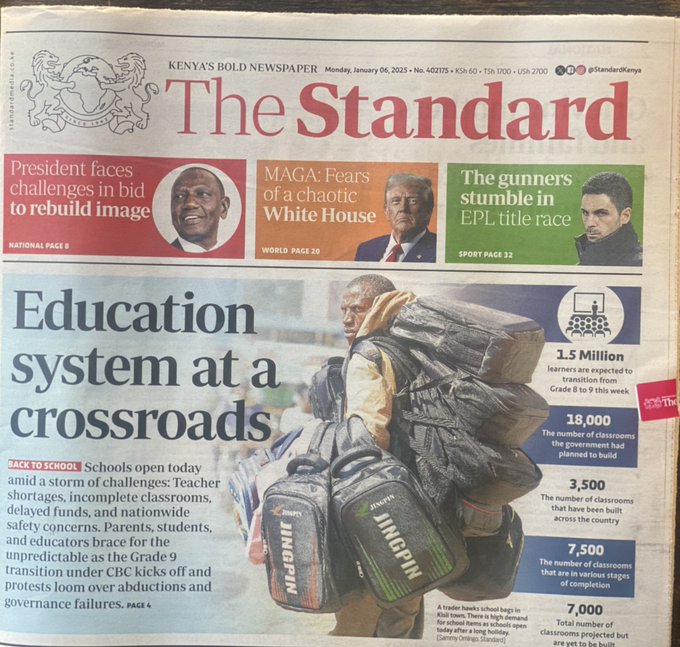TRANS NZOIA, Kenya—The Competency-Based Curriculum (CBC) unveiled in Kenya in 2017 under the 2-6-3-3 education system to replace the 8-4-4 education system, which had served Kenya for 32 years, continues to face significant criticism from various stakeholders.
The latest is vocal Trans Nzoia Governor George Natembeya, who has criticised the government’s rollout of the education system through the Ministry of Education.
CBC’s implementation has gradually been expanding to different grades.
For instance, it was implemented in Grade 4 by 2020, and the rollout is planned to continue until Grade 12 by 2028.
However, according to Governor Natembeya, a fierce critic of the ruling Kenya Kwanza government, the issue of CBC is complicated.
“Myself, I don’t understand CBC. I don’t know. I have asked teachers, parents, and even the Ministry of Education, who also doesn’t know or understand CBC. Even if you were to ask the president, he equally doesn’t understand CBC,” said Governor Natembeya.
What Governor George Natembeya thinks about CBC
Governor Natembeya, who made the remarks during the burial of Bishop Stephen Wamuti Njuguna in Muhuti Village, Cherangany Sub-County, accused the government of what he termed as wasting the future of Kenyan children.
“It appears that some people sat down and planned how to come up with CBC without thoroughly thinking through it,” added Governor Natembeya.
The county boss, who recently clashed in a burial with National Assembly Majority Leader Kimani Ichung’wah, said that the main agenda of education is to equalise life.
“Without proper education, I wouldn’t be standing before you today. Only through education can you rise from poverty and emerge as a successful person in life. How can we as a nation adopt an education system that is not recognised elsewhere?” he posed.
The English Ochot Odong told me that I cannot be taking my children to Kenyan schools. After unsuccessfully challenging CBC in Court, I saw sense in Ochot’s wisdom and dispatched the Duke and Duchess to Scotland. Where are those who supported CBC? Kuleni kiburi yenu.
Governor Natembeya criticised the government for releasing the Kenya Primary School Education Assessment Learner (KEPSEA) reports recently.
“Some candidates sat for the KEPSEA examinations, yet no one knows the results were released. You realise that no one passed or failed these examinations. Where can this happen in this world? People should stop joking. We need to get serious,” he said.
What is the Kenyan Competency-Based Curriculum (CBC)
The new CBC curriculum has moved the national examination that determines a child’s academic future from grade 8 to grade 9.
In the new national examination in grade 9, only students who pass highly in mathematics and science will be allowed to study STEM (the most coveted area of study in Kenya because of future employment opportunities).
The rest of the students will be placed on the social science or arts and sports track, depending on their examination scores.
In a developing country like Kenya, getting employment in the non-STEM and non-mathematical fields of study is very difficult.
I don’t understand CBC, I’ve asked teachers, and they don’t understand CBC. Parents don’t understand CBC, and even if you look at the President, he doesn’t understand CBC either, which is why he formed a task force – Governor Natembeya.
According to Governor Natembeya, there is nothing like free basic education.
“The government is lying because until now, there has been no capitation. No money has been disbursed to schools from primary to secondary. Secondary school students are still at home. They are yet to be paid for their school fees, which are Sh 22,000,” said the governor.
The county boss said it should be so when the government talks about free education.
“Let it be that way without charges. Don’t say that you will pay Sh 22,000 for each student and then allow a school headteacher to add an extra Sh 10,000, claiming it’s for lunch. This extra levy of Sh 10,000 prevents this student from utilising the Sh 22,000,” explained the governor.
Why school heads charging extra levies are in hot water
The tough-talking Governor Natembeya further accused the government of what he termed as wasting the future of Kenyan children.
“I know so many students are at home because they have been sent away from school after failing to pay monies for lunch. So, as a country, we need to consider the plight of all those below us,” he added.
Governor Natembeya’s remarks come hours after Education Cabinet Secretary Julius Migos Ogamba emphasised the government’s commitment to curbing the practice, which has sparked widespread complaints among parents.
“We will not tolerate any attempts by heads of institutions to impose irregular charges,” CS Ogamba said.
He affirmed that field officers have been directed to comply with this directive strictly, reinforcing the ministry’s stance against additional, unapproved levies.
The directive comes amid growing discontent from parents over various unofficial charges, such as teacher motivation fees, funds for examination papers, budget support, and tuition.
These levies, often imposed outside the official fee structures, contravene the ministry’s regulations, stipulating that any additional costs must be pre-approved during parents’ meetings supervised by education officials.





